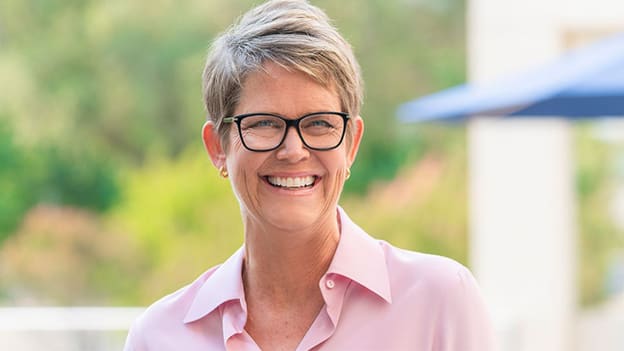When 'business as usual' is not an option, we need to focus on helping each other: VMware's Betsy Sutter

Betsy Sutter joined VMware in January 2001, where she has shaped the culture and employee experience while leading all aspects of VMware’s people strategies and functions. In this role, she leads the hiring, development, and engagement of the best and brightest, as VMware has grown from 100 employees to more than 20,000 globally.
As the developer of an ever-evolving human resources organization, including innovative expertise centers, service delivery channels, and a modernized HR partnering organization, she has aligned the people strategies with the business goals. Sutter has also built (and re-built) a world-class staffing organization and has overseen the successful acquisition of more than 60 companies. In 2008, Sutter founded the VMware Foundation, redefining citizen philanthropy in the corporate world. She is also passionate about bringing inclusion and diversity away from the edge and into the core of VMware’s priorities and operating model.
Here are the excerpts of the interview.
It's a changed world. Isn't it? Cost-cutting, retrenchments, job losses are now the reality facing businesses and employees across the world.
The truth is that we are all living through a very stressful and traumatic time. There’s a learning curve here, to be certain, and all we can really do is try our best to support our employees, customers, and partners. At a time when “business as usual” is not an option, we need to focus on helping each other, supporting our employees, and assisting our customers as they respond and adapt.
How can businesses adapt to this crisis which has impacted companies, economies, and societies?
I see a lot of businesses doing right by their employees by offering pandemic leave, flexibility within schedules and workloads, and offering the necessary resources to work remotely.
Everything we do at VMware, from how we communicate to the support we provide, comes from an empathetic, individual-centered perspective. Every meeting, phone call and discussion I have with my team starts with “how are you doing?” and “how can I support you?” From a more formal perspective, we also conduct regular pulses/surveys with our teams to understand how they are doing and what they need to do their jobs. In some cases, ensuring that people have a proper home office environment can really help improve their physical and mental wellness.
How is the larger conversation between CHROs and CEOs evolving? Given that there is this increasing realization that people are the true assets of a company.
This is a crucial time for CHROs and CEOs to communicate regularly and work in lockstep on how best to support employees. I feel very fortunate to work with our CEO Pat and the rest of the leadership team at VMware because they recognize how important our people are and are willing to do what’s necessary to support them.
We will do our best to support our employees and their needs in the weeks and months ahead. While we are distributed, we are creating a number of resources to support our employees and keep them connected. A few examples include: Employees who take part in our insurance plans have access to emotional support resources and personnel. We also have a pandemic leave policy, which provides time for caregivers to tend to their children, parents, or other family members.
We’ve also instituted a number of programs and touchpoints with our teams to ensure we’re providing people with mental and physical outlets.
Businesses across the world are struggling to make fast, hard decisions, often serving highly diverse customer bases. Do you think leadership diversity matters in handling crises like COVID-19?
Leadership diversity always matters – especially during times of crisis. VMware values and celebrates the power of human difference, and D&I is woven into the fabric of the company.
This pandemic is affecting different groups of people in very different ways. It’s important that leadership represents various groups to ensure everyone’s needs are accounted for and met so that we are providing comprehensive support to employees that meet the needs of a range of people – from pandemic leave policy to give time for caregivers to tend to their children, parents or other family members, to flexible work arrangements for parents who are homeschooling their children.
We are victims of one of the most dreadful and far-reaching disasters of our lifetimes. Amid this COVID-19 crisis, what should be the priorities of HR and talent leaders?
The focus should be on our people. Full stop. I can’t stress enough how important it is that HR folks and other company leaders check in with their employees and make sure they’re getting the support they need. This is a trying time for everyone for various reasons, and while we can’t control the effects of the virus, we can control how we choose to help our people cope. Offering things like extended sick days, flexible work schedules, and mental health resources can make a huge difference for employees’ mental and physical wellbeing.
Times of crisis have historically also been opportunities for change. Are you optimistic that as we emerge from this, it could be a chance to create a better economy?
Absolutely. We are dedicated to learning from this trying time, growing and coming out stronger in the end. It’s clear that the workplace of the future will be forever changed, and we are working tirelessly to ensure our company and employees can successfully adapt to whatever our new normal looks like.
While we’ll likely be feeling the effects of COVID-19 for a long while, I’m optimistic this period will serve as a learning opportunity for businesses everywhere and hopefully better prepare us for any similar future events.
How is VMware responding to COVID-19? How are you coping?
First and foremost, we are prioritizing the well-being and safety of our employees, customers, and partners. Our goal from the onset of the pandemic has been protecting our people through several actions and initiatives including:
With the continuing escalation of COVID-19 cases around the world and out of an abundance of caution, most of the global workforce is working remotely and we are regularly assessing the situation to adjust or extend, as necessary. In addition, proactive measures are established across VMware offices, such as providing hand sanitizer and other disinfectants in public areas, revising cleanup protocol, and having masks on hand for individuals who are not feeling well or exhibiting symptoms of an illness.
VMware’s service delivery and supply chains are being monitored regularly by the Global Crisis Management Team to determine our ability to adequately handle business functions and meet corporate customer, and stakeholder obligations. To protect the mental well-being of our employees, VMware has also implemented no-questions-asked pandemic leave and a new wellness program we’re encouraging employees to take advantage of. Beyond these safety measures, VMware has also successfully enabled more than 30,000 people in our workforce to work from home. We are also leveraging VMware technology to empower employees, customers and partners to remain productive.
As businesses and economies reopen post-COVID-19, what should be the approach/priorities of business and HR leaders in terms of hiring and recruitment?
I think potential employees’ priorities are really going to change coming out of this. Something that will be important for HR leaders to recognize is that people are going to be looking for jobs that offer a lot of flexibility, in case something like this happens again. People will be paying close attention to things like remote work policy, sick day/leave, hazard pay, etc., and as HR leaders, we need to factor this in carefully to our compensation packages moving forward.
I also think it’ll cause recruiters to look at non-local candidates who might not have been considered before this point. Now that we know so many of us can successfully work remotely, the talent pool will open up and allow for more diversity within candidates.
The coronavirus pandemic, as experts say, will change the way we work globally. How do you see the future of work, life post-COVID-19?
It's really tough to say because the impact will be so significant and unlike anything we’ve experienced before. My hope is that post-COVID-19, we will see employers express more compassion and provide more flexibility. From a tech perspective, I also believe we’ll be more reliant on remote technologies than ever before. There will be a need and desire to make the remote work process as functional and simple as possible.
As we navigate the pandemic and this challenging time, there is a paradox at play. With roughly half the global population under some form of lockdown, we’re experiencing a deeper sense of unity and shared responsibly in our communities.
At the same time, we cannot sugar-coat that the pandemic has exposed a fundamental lack of access to healthcare, education, jobs, and financial security. This is a defining moment that creates a once-in-a-generation opportunity to challenge old assumptions and drive structural changes that open the playing field in critical areas.
















